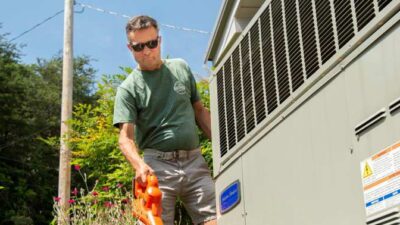With temperatures already reaching triple digits this summer, remember to take precautions to avoid heat-related illnesses. Most heat-related cases occur in June and July.
TIPS TO STAY COOL
Stay in an air-conditioned area when possible. If your home does not have air conditioning, go to a shopping mall, library, or other community building that does. Even a few hours in an air-conditioned environment can keep the body cool.
- Drink water often — don’t wait until you’re thirsty.
- Avoid sugary drinks and alcohol — they don’t hydrate.
- Continually provide pets with fresh water.
- Avoid preparing or eating hot meals; they add heat to the kitchen and the body.
- Limit outdoor activity to early morning and late evening when it’s coolest.
OUTDOOR HEAT SAFETY TIPS
- Wear a hat and lightweight, light-colored, loose-fitting clothes.
- Rest in the shade frequently.
- Drink water every 15 minutes even if you don’t feel thirsty.
- Wear sunscreen of SPF 30 or higher — sunburn can slow the skin’s ability to release heat.
If you are caring for small children or older adults, make sure to offer water frequently and watch them closely for signs of heat exhaustion or heat stroke. These illnesses can cause damage to the brain and other vital organs. These conditions occur when the body temperature rises faster than the body can cool itself.
SIGNS OF HEAT-RELATED ILLNESSES
Heat Exhaustion
- Feeling faint or dizzy
- Excessive sweating
- Cool, pale, clammy skin
- Nausea or vomiting
- Rapid, weak pulse
- Muscle cramps
- Tiredness
Heat Stroke
- Throbbing headache
- No sweating
- Red, hot, dry skin
- Nausea or vomiting
- Rapid, strong pulse
- Loss of consciousness
- Body temperature above 103 degrees
Move people experiencing signs of heat-related illness to a cool place as soon as possible. To help them cool down, apply cool, wet cloths to their head and body, or place them in a cool bath. People should get medical help immediately if they vomit, their symptoms last longer than one hour, or their symptoms worsen.
For more information about heat-related illness, visit www.cdc.gov/disasters/extremeheat/index.html.










